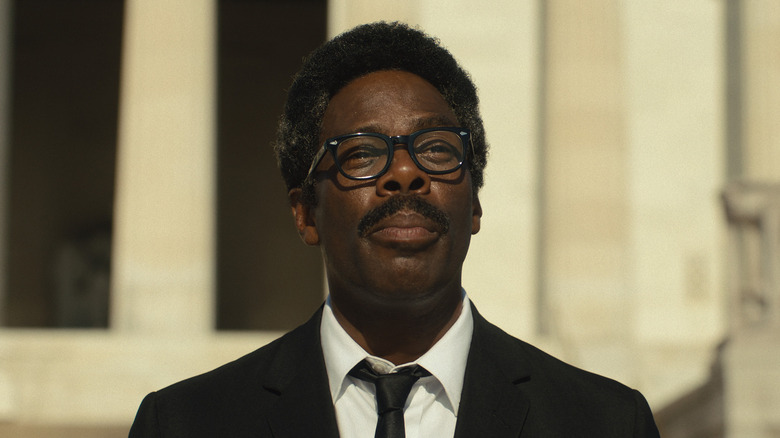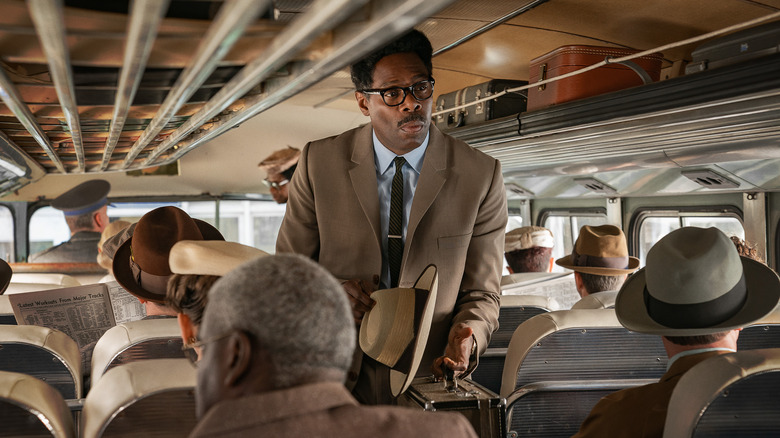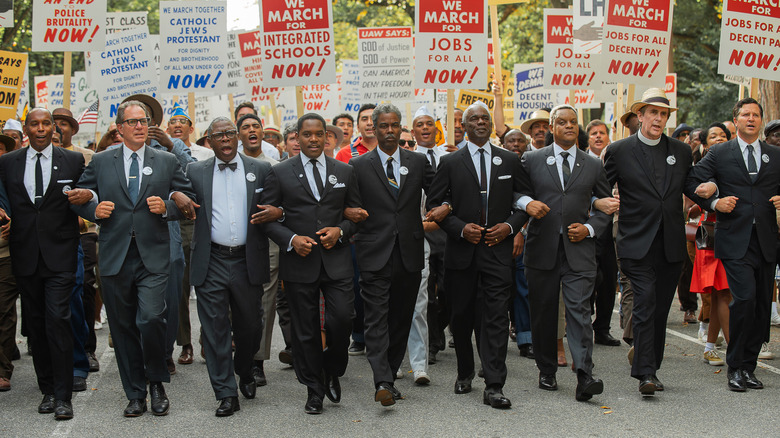Rustin Review: A Civil Rights Biopic That Fails To Match The Fire Of Its Subject
- Strong performance from Colman Domingo
- Interesting commentary on the Civil Rights Movement
- Conflicts between supporting characters are muddled
- Writing is occasionally self-important
By this point, we've all seen dozens of civil rights dramas, delving deep into the inspirational mid-century movement that sought to ensure that everyone, regardless of race, had equal protections under the law. But "Rustin" is one of the first films devoted to a civil rights figure who has historically been absent from the narrative: Bayard Rustin, played by the incomparable Colman Domingo. His central role in the Million Man March — and history's erasure of it — creates a thoughtful exploration of what voices were embraced as part of the Civil Rights Movement and what voices were ignored. It's occasionally more interested in generating applause-worthy soundbites than anything else, but Domingo proves once again capable of making anything he touches shine.
Bayard Rustin has a complicated relationship with the Civil Rights Movement, a cause he is incredibly devoted to that simultaneously keeps him at arm's length. He is a brilliant organizer, passionately inspired by the cause, and incredibly detail-oriented, spending untold hours working for the rights of Black Americans. But in the eyes of the Black political community, he has two qualities that make him ... shall we say, uniquely unsuited for a high-profile role in the movement. Firstly, he had previously been a member of the Young Communist League USA, an association that was seen to immediately compromise a political activist. Perhaps more importantly, in the homophobic 1960s, he had been convicted years earlier of "sex perversion," and his identity as a gay man was fairly open for the time. For these reasons, Rustin became one of the unsung heroes of the Civil Rights Movement, forced to navigate the complicated and often conflicting needs of different stakeholders in the Million Man March but not receiving any public credit for it until many years later.
Colman Domingo shines
As Bayard Rustin, Colman Domingo is the heart and soul of the film. He gives Rustin a powerful sense of dignity, even when he's portraying some of his less flattering qualities. Rustin is incredibly intelligent and passionate, but he's also grandiose, self-important, and has a wandering eye that isn't necessarily sensitive to the feelings of those in his inner circle. But his flaws make him human, and all of these traits make it all the more poignant when he chooses humility rather than fame through his involvement in the march. Domingo doesn't put a foot wrong throughout the film, and his performance is a large part of what works about "Rustin."
Although it has a fairly nuts-and-bolts directorial style, its matter-of-fact nature helps to capture a sense of the massive logistical feats involved in organizing the march. Featuring warring factions within the movement and Rustin's endlessly determined attention to detail, the film shows what it took to get so many different people with different perspectives onto the same path of liberation together. To get a million people all on board with something, endless compromises need to be made, and that is what the film is so adept at showing — that the successful execution of this event was more important than any one person or their specific beliefs.
But does it do justice to its subjects?
"Rustin" is not without its flaws, though. Like Rustin himself, the film is a little self-important, incredibly eager to pat itself on the back and preach to the choir of audiences who are likely already on its side. Although the complexities of the relationships between different factions in the movement are interesting and add nuance to the march's narrative, their squabbles occasionally become over-complicated and muddled as a result. There are characters from the NAACP who are tragically underwritten, basically only existing to create conflict for Rustin. Actors like Chris Rock and Jeffrey Wright are underutilized as foils to the scrappy Rustin.
All of this adds up to a film that is interesting because the historical figure it revolves around is interesting, rather than any merits of its own, aside from a strong central performance from Colman Domingo. It touches on struggles between the intersection of race and sexual identity, hanging its hat on the overarching question of who is allowed to represent a movement and who is relegated to the shadows. Although Bayard Rustin is a more than worthy biopic subject who is ably brought to life here, "Rustin" itself fails to rise above the limitations of its genre, becoming a totally serviceable but unexceptional biographical film. Bayard Rustin was full of passion, but "Rustin" has a hard time bringing the same fire to its production.
"Rustin" hits theaters on November 3 before streaming on Netflix on November 17.


